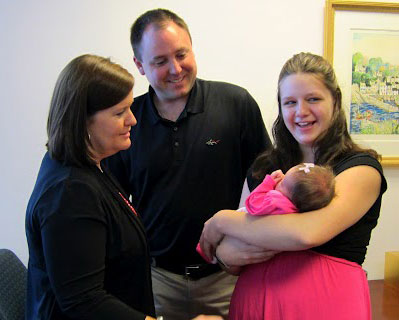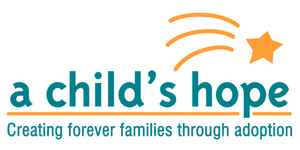 Thirty years ago, when a woman had an unplanned pregnancy, she often was sent to a convent or a maternity home until the baby was born. Afterward, her family and friends did not discuss that she ever gave birth. With the typical closed or confidential adoption, she had no contact with the child after it was adopted. On the other side, many adoptive parents never told their children they were adopted.
Thirty years ago, when a woman had an unplanned pregnancy, she often was sent to a convent or a maternity home until the baby was born. Afterward, her family and friends did not discuss that she ever gave birth. With the typical closed or confidential adoption, she had no contact with the child after it was adopted. On the other side, many adoptive parents never told their children they were adopted.
But times have changed, with a welcome trend toward openness and acceptance about adoption. Now, birthmothers attend school until their due date; continue working; name their babies; and are able to spend time with their babies at the hospital. Their friends, co-workers and relatives know about the pregnancy and the adoption plan. Adoptive parents know the birth parents and may treat them as extended family. One study shows that 95% of today’s adoptions are open, at least to some degree.
However, when I sit with prospective adoptive parents to talk about adoption, there is still a learning curve about openness in adoption. Here are some details about open adoption that may help.
What are Open Adoptions?
When you agree to an open adoption, it means that you as a birth parent can have some type of contact with the adoptive parent and adopted child. That may be indirectly, through letters and photos, or more directly, through phone calls and visits. In many cases, the birth mother can help select the adoptive families and that the child grows up aware he or she is adopted. The amount of contact depends on everyone’s level of comfort—it may be in the form of an occasional letter, or it may be sharing holidays together. With open adoption, the adoptive parents retain their legal rights and responsibilities for raising the child, but the birth parent has an opportunity to be involved in the child’s life.
Birth and adoptive parents can decide on varying degrees of openness. For example, a birth mother may want to select the family, but not maintain contact later. In an open adoption, she may want to be able to have direct contact with the child and adoptive family, but in a semi-open adoption, she may prefer to communicate through a lawyer or social worker. With agreement, the amount and frequency of contact may also change over time.
Advantages of Open Adoptions
Numerous studies and stories have shown how closed adoptions affect everyone involved. The birth parents often feel a life-long sense of grief and loss, with no opportunity to see the child. Adoptive parents may have questions about the child’s background that can never be answered, since no communication with the birth parents is allowed. The adoptive children may be the ones who have the most difficulty, because they cannot access their history, have no sense of connection with their birth family and may often wonder what circumstances of their birth led to the secret of adoption.
In contrast, research reported by the Evan B. Donaldson Adoption Institute says that birth mothers in open adoptions have less worry and grief than those in closed adoptions, and are better able to adjust after the adoption. Adoptive parents also have positive experiences, and that the openness actually reduced fears of losing their child to the birth parents. Adopted teens said that open adoptions allowed them to understand why they were placed for adoption, helped increase positive feelings for the birth mother and enabled the teens to better understand who they were, in connection to their birth and adoptive families.
Could An Open Adoption Be Right For You?
The Child Welfare Information Gateway, part of the U.S. Department of Health and Human Services, suggests asking these questions:
- Do I want to have a say in who will raise my child?
- Does it matter to me if I won’t know if my child is safe and healthy?
- Do I want to watch my child grow up through photos, letters, phone calls or visits?
- Do I want to be able to tell my child about his or her family background or other important information in the future?
- Do I want my child to know, for example, if he or she looks or acts like someone else in the family?
A yes to any of these questions may mean open adoption is a good option. Remember: to be effective, an open adoption requires ongoing trust, communication and flexibility on all sides.
If you’d like to learn more about adoption—open, closed, or have other questions, please call A Child’s Hope today at 877-890-4673 or text “Pregnant” to 919-971-4396. Our experienced, compassionate counselors can provide the information you need to make the best decision for you and your child.
